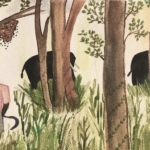Rewilding, Restoration, and the Future of Nature Recovery
James Bullock
- Start Friday 24 Nov 2023 4:15pm
- Finish Friday 24 Nov 2023 5:15pm
- Venue Large Lecture Theatre
- Watch seminar recording (external site)

There is much excitement about ‘nature recovery’, with many scientists, conservation practitioners and commentators having opinions about how this might be achieved. While many focus on single solutions, such as ecological restoration, rewilding, land sparing, etc, effective recovery will likely involve ‘pick and mix’ approaches that match local needs and national priorities. I will talk about how we can combine rewilding, restoration and agroecological approaches to give pragmatic solutions for recovery. But, we should not ignore massive constraints on nature recovery, such as extinction debt, fragmented landscapes and loss of ecological complexity. In particular, many discussions on recovery do not engage with the fact that rapid climate change will undermine what can be achieved and will be driving ongoing species loss. Indeed, climate change demands that we re-think conservation aims and approaches, and even how we promote nature recovery. I will talk about our concept of ‘Survival Ecology’ as a way of re-conceptualising conservation in a time of anthropogenic climate change.
Biography
James is a conservation ecologist at the UK Centre for Ecology & Hydrology, with a long history of fundamental and applied research into ecological restoration, rewilding, and agri-ecological management. He is dedicated both to understanding ecological processes in complex, real-world situations, and translating this into solutions for nature recovery that are pragmatic and effective. To do so he also works across disciplines, with, e.g., climate scientists, social scientists and geographers.
The Leverhulme Centre for Nature Recovery and Biodiversity Network are interested in promoting a wide variety of views and opinions on nature recovery from researchers and practitioners.
The views, opinions and positions expressed within this lecture are those of the author alone, they do not purport to reflect the opinions or views of the Leverhulme Centre for Nature Recovery/Biodiversity Network, or its researchers.


